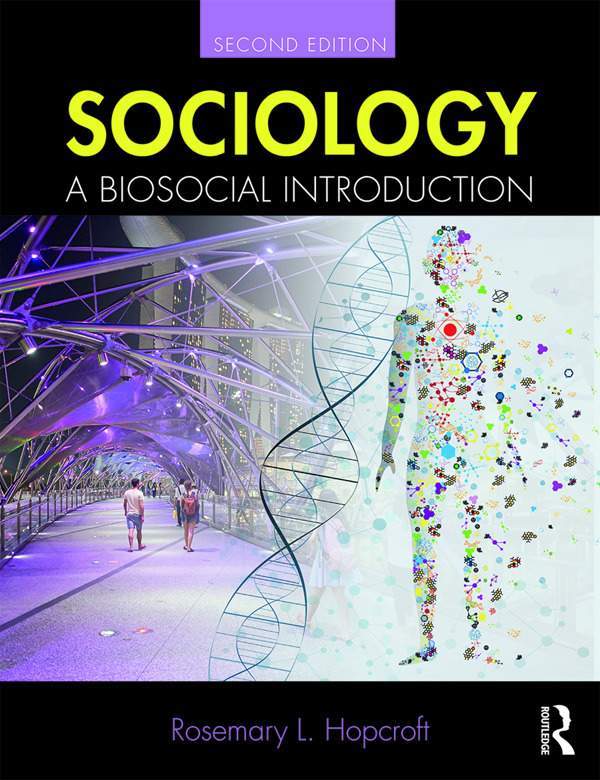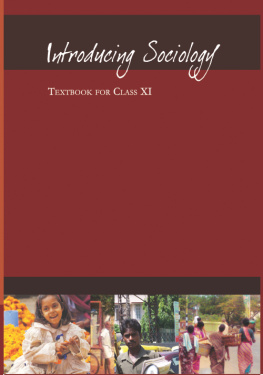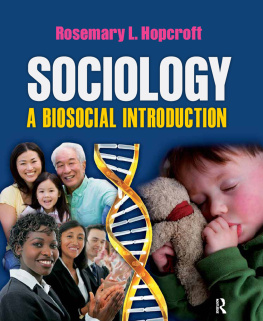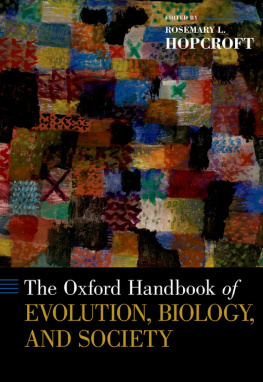Rosemary L. Hopcroft - Sociology
Here you can read online Rosemary L. Hopcroft - Sociology full text of the book (entire story) in english for free. Download pdf and epub, get meaning, cover and reviews about this ebook. year: 2018, publisher: Taylor & Francis (CAM), genre: Politics. Description of the work, (preface) as well as reviews are available. Best literature library LitArk.com created for fans of good reading and offers a wide selection of genres:
Romance novel
Science fiction
Adventure
Detective
Science
History
Home and family
Prose
Art
Politics
Computer
Non-fiction
Religion
Business
Children
Humor
Choose a favorite category and find really read worthwhile books. Enjoy immersion in the world of imagination, feel the emotions of the characters or learn something new for yourself, make an fascinating discovery.

- Book:Sociology
- Author:
- Publisher:Taylor & Francis (CAM)
- Genre:
- Year:2018
- Rating:3 / 5
- Favourites:Add to favourites
- Your mark:
- 60
- 1
- 2
- 3
- 4
- 5
Sociology: summary, description and annotation
We offer to read an annotation, description, summary or preface (depends on what the author of the book "Sociology" wrote himself). If you haven't found the necessary information about the book — write in the comments, we will try to find it.
Sociology — read online for free the complete book (whole text) full work
Below is the text of the book, divided by pages. System saving the place of the last page read, allows you to conveniently read the book "Sociology" online for free, without having to search again every time where you left off. Put a bookmark, and you can go to the page where you finished reading at any time.
Font size:
Interval:
Bookmark:

Hopcrofts introductory sociology textbook is one of the very few that takes seriously the necessity for developing genuinely scientific explanations of human social behavior and that strives to do so by forging explicit linkage with the basic principles of the evolutionary behavioral sciences. The effort is laudable, and it is in keeping with the longstanding, but as yet not fully realized, promise of a truly scientific sociology.
Timothy Crippen, Professor Emeritus,
University of Mary Washington
In an era of human genome research, environmental challenges, new reproductive technologies, and more, students can benefit from introductory sociology text that is biologically informed. This innovative text integrates mainstream sociological research in all areas of sociology with a scientifically informed model of an evolved, biological human actor. This text allows students to better understand their emotional, social, and institutional worlds. It also illustrates how biological understanding naturally enhances the sociological approach.
This grounding of sociology in a biosocial conception of the individual actor is coupled with a comparative approach, as human biology is universal and often reveals itself as variations on themes across human cultures. Tables, figures, and photos, and the authors concise and remarkably lively style make this a truly enjoyable book to read and teach.
Rosemary L. Hopcroft is Professor of Sociology at the University of North Carolina at Charlotte. She has published widely in the areas of comparative and historical sociology and evolution, biology, and society in journals that include the American Sociological Review, American Journal of Sociology, and Social Forces. She is the author of Evolution and Gender: Why It Matters for Contemporary Life, which received the 2018 Award for Best Book by the Evolution, Biology, & Sociology Section of the American Sociological Association.
Second edition published 2019
by Routledge
52 Vanderbilt Avenue, New York, NY 10017
and by Routledge
2 Park Square, Milton Park, Abingdon, Oxon, OX14 4RN
Routledge is an imprint of the Taylor & Francis Group, an informa business
2019 Taylor & Francis
The right of Rosemary L. Hopcroft to be identified as author of this work has been asserted by her in accordance with sections 77 and 78 of the Copyright, Designs and Patents Act 1988.
All rights reserved. No part of this book may be reprinted or reproduced or utilised in any form or by any electronic, mechanical, or other means, now known or hereafter invented, including photocopying and recording, or in any information storage or retrieval system, without permission in writing from the publishers.
Trademark notice: Product or corporate names may be trademarks or registered trademarks, and are used only for identification and explanation without intent to infringe.
First edition published by Paradigm Publishers 2010 and Routledge 2016
Library of Congress Cataloging-in-Publication Data
A catalog record has been requested for this book
ISBN: 978-1-138-04093-9 (hbk)
ISBN: 978-1-138-04968-0 (pbk)
ISBN: 978-1-315-16944-6 (ebk)
Visit the eResources: www.routledge.com/9781138049680
THIS TEXT INTEGRATES mainstream sociological research in all areas of sociology with a scientifically informed model of an evolved, biological human actor. The goal for students is to help them understand that all social phenomena are a product of the interaction of the nature of individuals with the social context and group-level phenomenanever one or the other, always both. The goal for instructors is to help them understand how the inclusion of biology strengthens and enhances the sociological approach. I show how this inclusion can be done effortlessly, with little change to sociological theories and the traditional sociological foci on group dynamics, roles, norms, and culture.
In this new edition of the textbook, I further discuss the complementarity of sociological with evolutionary approaches, showing how evolutionary approaches can give ultimate answers (answer the why questions) to the proximate explanations (answering the how questions) given by sociologists. I also discuss the initial dislike of any use of biology in sociology with an account of the sociobiology wars of the 1970s (see ), and note how these controversies have been resolved, mostly in favor of greater inclusion of biology within sociology. In doing so, I detail how incorporating evolutionary biology and biology into sociology does not amount to social Darwinism or anything of the kind. I discuss the myriad problems with Herbert Spencers evolutionary theorizing at the group level and how it differs the contemporary theory from evolutionary biology, which largely rejects group selectionism and any idea of differential group fitness. Research from contemporary biology shows how all humans share the vast majority of evolved traits and genetic characteristics, with only small differences between individuals, both within and between groups.
I have taught introduction to sociology using this textbook for over seven years now, and in teaching I have found that certain orders of presentation of topics and material work better than others. The new edition of the text reflects this revised order of presentation. There is also the addition of points that should have been included in the first edition of the text that werent (e.g., discussion of social structure in ). I also now include a number of spotlight on research text boxes, where a particular piece of recent sociological research on the topic of the chapter is discussed. These are designed to show how sociologists do sociology. Where appropriate, all statistics in this new edition of the text book have been revised and updated.
Original characteristics of the original text have been retained, namely, the linking of the discipline of sociology with the life sciences while maintaining the traditional sociological foci on the importance of group dynamics, roles, norms, class, institutions, and culture. All the standard tools of sociological analysis and the primary subject areas of sociology are covered in the text, with the primary difference being the addition of a chapter on human biology and evolved predispositions. This biosocial approach is linked to a comparative approach where possible, as it is important to see the flexibility of humans in different historical and material contexts. This aspect of the text owes a great debt to Gerhard Lenskis pioneering efforts in his text Human Societies. Human biology may be universal, but human social behavior differs substantially depending on the historical time period and cultural setting. Thus, information on a variety of different types of societies in different time periods is presented. A global perspective is utilized when appropriate.
Feature | Benefit |
Textboxes | These offer examples and specific elaborations of concepts in the text. |
Running Glossary Terms | Found in the margins near a terms first use, these provide instant definitions of new ideas and concepts. |
Maps | These connect data and information to geography and spatial orientation. |
Font size:
Interval:
Bookmark:
Similar books «Sociology»
Look at similar books to Sociology. We have selected literature similar in name and meaning in the hope of providing readers with more options to find new, interesting, not yet read works.
Discussion, reviews of the book Sociology and just readers' own opinions. Leave your comments, write what you think about the work, its meaning or the main characters. Specify what exactly you liked and what you didn't like, and why you think so.












